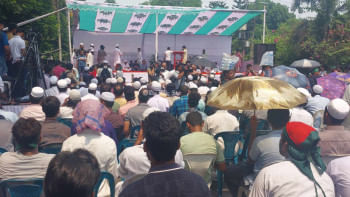Rape Case Investigation: Delays put justice at risk

Two schoolgirls lost their way back home in the capital's Badda from an outing on the night of February 8 last year. Wandering on the road for a few hours, they came across one Emon Hossain.
Emon, 30, sacked organising secretary of Badda Thana Krishak League, promised the girls, both aged around 13, to take them to his home nearby, saying they were like his daughter who is of their age and can stay the night safely with her.
Convinced, the girls agreed to go without knowing the danger lurking for them.
Emon instead took them to a warehouse at a secluded place in Badda where he along with his accomplices Abdur Rob, 32, and Md Kabir, 30, raped them, according to the mother of one of the schoolgirls. She filed a rape case against the three with Badda Police Station on February 10.
Eleven days into the incident, police arrested all three accused.
Yet, it took nine months to submit the charge sheet although the Women and Children Repression (prevention) Act stipulates 60 working days for police to complete a rape case probe -- which a court may extend for another 30 days.
There are many more examples of such delays.
A top official at Dhaka Metropolitan Police headquarters said in the first of week of November that they could not submit charge sheets in at least 10 gang rape cases, even in eight to 12 months.
The cases were filed with Badda, Vatara, Khilgaon, Jatrabari, Kafrul, Kamrangirchar and Darus Salam police stations, he added.
At least two of the cases were still awaiting charge sheets till filing of this report.
According to a High Court ruling issued in December 2016, rape cases must be concluded within 180 days.
The officer said the accused in most of the 10 cases were arrested, and in five cases the accused confessed to their crimes before the court. Yet police could not press charges within the stipulated time because of the delay in receiving medical reports or DNA test results.
REASON FOR THE DELAY
Badda police said they received DNA reports of two cases -- including that for the rape of the two schoolgirls and another filed on April 21 following the gang-rape of a 20-year-old girl -- from the DNA Profiling Lab at Dhaka Medical College Hospital (DMCH) in November.
They already submitted the charge sheets in the two cases.
"The charge sheet of another gang rape case filed with our police station around a year ago is still pending as we are yet to receive the reports," said an officer of the police station in mid-December.
"It often takes six to seven months to get such reports," he said, requesting anonymity.
The officer added that the court concerned sometimes summons investigation officers (IOs) to explain the reason behind the delay in charge sheet submission. Sometimes, the accused is granted bail if the charge sheet is not submitted within six months and he then goes into hiding.
Sharif Aktaruzzaman, chief of the National Forensic DNA Profiling Laboratory (NFDPL) of Dhaka Medical College, said last month that if the collection of all necessary samples remains pending, they cannot prepare the reports in time.
"For example, sometimes we get the victim's samples but not that of all the accused. If police delay sending samples, the preparation of the report also gets delayed," he explained.
The lab was closed for a month due to the pandemic, which hampered some work, yet no DNA test results are pending, he added.
Replying to another query, he said, depending on the number, type and quality of samples, it takes a month to a month and a half to complete a DNA report.
For the Badda rape case of two girls, an official said police had appealed to a Dhaka court for collection of DNA samples of the three accused a few days after their arrest in February last year. They got the order in July as the court was closed due to the pandemic.
On July 17, they sent samples of the accused to the DNA lab and received the results in November. "The lab did not complete the test until we provided them the medical report of the victims, which we received on October 16," he told The Daily Star.
Dr Bilkis Begum, coordinator of the One Stop Crisis Centre at DMCH, admitted that medical reports of many of the rape cases were delayed.
"Many radiology staff of DMCH were on Covid duty and they did not give us time. They are also hesitant to touch victims in fear of infection."
She, however, could not give the number of such pending reports.
Apart from the lab at Dhaka Medical College, the Criminal Investigation Department (CID) also runs a lab from where police can get this profiling done.
Additional DIG Md Shahadat Hossain, head of the Forensic Department of CID, said they never delay completing DNA tests in important cases.
"It is actually an excuse of the IOs that delay in receiving DNA reports is resulting in delayed submission of charge sheets," he told The Daily Star yesterday.
Md Walid Hossain, deputy commissioner (media and public relations) division of DMP said, "Cases related to women repression are our high priority and high-ranking officials supervise these.
"Time limit for completing investigation in the cases filed under the Women and Children Repression (prevention) Act is stipulated, but the probe cannot be concluded unless medical reports and in some cases DNA reports are not received."
Last year, the act was amended introducing death penalty as the highest punishment for rape following a number of heinous incidents that sparked huge protests countrywide.
COMPLAINANT PRESSURISED
The complainant of the case over the rape of two school girls told The Daily Star on December 11 that Emon's family members called her several times and pressurised her to withdraw the case.
"They boasted that nothing would happen to Emon and he would obtain bail which will require a big amount," she said. "They asked me to withdraw the case taking the amount that they would have required to obtain Emon's bail."
Expressing frustration with the delay in completing the investigation, she said, "Now I do not even look for the updates of the case. I am poor and do not have enough money to continue the legal battle."
"I am worried about my daughter who stopped going to school and is passing days in a nightmare," she said with dismay.
Roki Shikder, president of Badda Thana Krishak League, a front organisation of ruling Awami League, claimed that Emon was sacked from the organisation seven to eight months before the alleged rape for his involvement in an illegal act.
There were instances where political pressures delayed and disturbed rape investigations, especially if the accused were from influential families or the ruling party, according to police officials.
Salma Ali, president of Bangladesh National Women Lawyers' Association, said everyone involved in medico-legal activities, including DNA tests, and trial procedures have specific responsibilities.
But due to lack of strong monitoring, accountability, transparency, coordination and expertise, the medico-legal activities and investigations are not done in time.
She further said due to the delays, investigation officers are transferred while the probe is incomplete and many important pieces of evidence get damaged, hampering the cases.
"The more investigation is delayed, more the cases go in favour of the accused," Salam said. "Besides, these delays often led to out-of-court settlements as the victims lose interest and energy in legal battles."
When the victims see offenders see roaming around them, they get traumatised, she added.
Referring to the recent amendment that makes a DNA test of every rape incident mandatory, Salma Ali said it will not be good idea as in the case of minor girls, DNA samples of the offender is not often found.
She suggested fixing a specific timeframe for completing medico-legal jobs like that in police investigations.

 For all latest news, follow The Daily Star's Google News channel.
For all latest news, follow The Daily Star's Google News channel. 



Comments